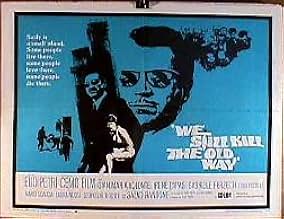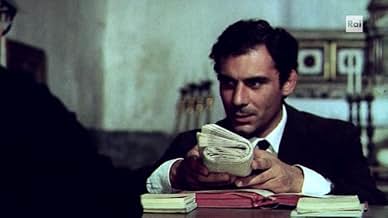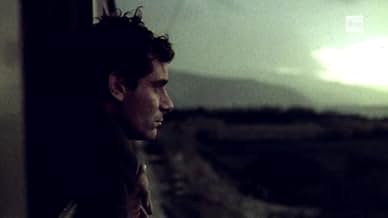IMDb-BEWERTUNG
7,0/10
2041
IHRE BEWERTUNG
Ein linksgerichteter Professor sucht nach der Wahrheit über zwei Männer, die während eines Jagdausflugs getötet wurden. Die Mafia, die Kirche und korrupte Politiker versuchen jedoch, dies zu... Alles lesenEin linksgerichteter Professor sucht nach der Wahrheit über zwei Männer, die während eines Jagdausflugs getötet wurden. Die Mafia, die Kirche und korrupte Politiker versuchen jedoch, dies zu verhindern.Ein linksgerichteter Professor sucht nach der Wahrheit über zwei Männer, die während eines Jagdausflugs getötet wurden. Die Mafia, die Kirche und korrupte Politiker versuchen jedoch, dies zu verhindern.
- Regie
- Drehbuch
- Hauptbesetzung
- Auszeichnungen
- 6 Gewinne & 2 Nominierungen insgesamt
Empfohlene Bewertungen
Gian Marie Volonte's got himself into some hot water this time! Doesn't he know that in Sicily, if someone gets murdered, you just keep your trap shut and let whoever the police randomly arrest go to jail?
Luigi Pistilli keeps getting letters telling him he's a dead man, and its making him a bit paranoid. Nevertheless, one morning he says goodbye to his wife, then his lover, and sets off with his friend to go hunting, only to find himself the prey. Two corpses later, we've got a bit Sicilian funeral to go to while the police chat about the people attending, including a well-respected lawyer (Gabriele Ferzetti) who's cousin (Irene Papas) was married to one of the victims, and Gian Marie Volonte, a professor friend of the two who starts poking in places that should not be poked.
Pistilli is generally thought to be the target as he was a bit of a fanny rat and some family members are arrested, but they are all illiterate so how could they cobble together those threatening letters. Volonte also finds that the words in the letter were from a Vatican-based newspaper, which leads him to the priesthood. Oh, and a lot of people are related in this film, so one of the priests is the uncle of Papas and Ferzetti.
It's a formula you'll see a lot of in these films, so it's just as well the lead actors are good! Volonte has the hots for the widow Papas and has to basically restrain himself every times he meets her, while Papas kind of has the hots for him too, leading to all kinds of awkward moments. Volonte is very good at the bookish professor who is just too smart and curious for his own good, while Papas just smoulders as the widow.
It looks absolutely scorching hot in Sicily in this film, and just like Damiano Damiani's Day of the Owl, the island itself is a character, with all the strange culture that lives on its land.
The only let down of the film is that the plot is a bit predictable, but it's by no means a bad film.
Luigi Pistilli keeps getting letters telling him he's a dead man, and its making him a bit paranoid. Nevertheless, one morning he says goodbye to his wife, then his lover, and sets off with his friend to go hunting, only to find himself the prey. Two corpses later, we've got a bit Sicilian funeral to go to while the police chat about the people attending, including a well-respected lawyer (Gabriele Ferzetti) who's cousin (Irene Papas) was married to one of the victims, and Gian Marie Volonte, a professor friend of the two who starts poking in places that should not be poked.
Pistilli is generally thought to be the target as he was a bit of a fanny rat and some family members are arrested, but they are all illiterate so how could they cobble together those threatening letters. Volonte also finds that the words in the letter were from a Vatican-based newspaper, which leads him to the priesthood. Oh, and a lot of people are related in this film, so one of the priests is the uncle of Papas and Ferzetti.
It's a formula you'll see a lot of in these films, so it's just as well the lead actors are good! Volonte has the hots for the widow Papas and has to basically restrain himself every times he meets her, while Papas kind of has the hots for him too, leading to all kinds of awkward moments. Volonte is very good at the bookish professor who is just too smart and curious for his own good, while Papas just smoulders as the widow.
It looks absolutely scorching hot in Sicily in this film, and just like Damiano Damiani's Day of the Owl, the island itself is a character, with all the strange culture that lives on its land.
The only let down of the film is that the plot is a bit predictable, but it's by no means a bad film.
A left-wing professor stressed by moral doubts (Gian Maria Volonté) has the rather strange idea to try to break the ambiant omerta in order to clear the violent death of two friends, honor issues happening just to conceal quite more material interests. But Sicily and its little folk of mute but watchful characters don't seem ready to accept this kind of trouble. Bound with beauty but ungraspable like the doctor's few disconsolate widow (Irene Papas), the island and its stifling sun know how to subdue the one who dares to upset their immutably established order, between a conspicuous church and an invisible mafia.
This marks the first collaboration between director Elio Petri, writer Ugo Pirro and actor Gian Maria Volonte which was to bear fruit in the extraordinary 'Indagine su un cittadino al di sopra di ogni sospetto' and is loosely adapted from the novel by Leonardo Scascia who was again to provide the source material for Rosi's stupendous 'Cadaveri Eccellenti'.
Scascia's novel was inspired by the assassination of a policeman by the Mafia and here Petri and his cinematographer Luigi Kuveiiller have created a striking contrast between the ravishing Sicilian scenery and the all-pervading corruption although there is perhaps a little too much use made of the 'zoom'.
Excellent script and taut editing with strong performances from Volonte, Gabriele Ferzetti, both of whom were awarded Silver Ribbons, the striking Irene Papas whose role does not really do justice to her talents and a marvellous cameo by Petri regular Salvo Randone as a blind oculist!
Petri's customary Left-leaning social criticism is in evidence here but what should have been a top class film is alas, for this viewer at any rate, weakened by imperfect post-synchronisation and some distinctly dodgy dubbing. The genius of Ennio Morricone is conspicuous by its absence here as the score by Luis Bacalov is intrusive, badly integrated and undermines rather than underlines the film's effectiveness.
Scascia's novel was inspired by the assassination of a policeman by the Mafia and here Petri and his cinematographer Luigi Kuveiiller have created a striking contrast between the ravishing Sicilian scenery and the all-pervading corruption although there is perhaps a little too much use made of the 'zoom'.
Excellent script and taut editing with strong performances from Volonte, Gabriele Ferzetti, both of whom were awarded Silver Ribbons, the striking Irene Papas whose role does not really do justice to her talents and a marvellous cameo by Petri regular Salvo Randone as a blind oculist!
Petri's customary Left-leaning social criticism is in evidence here but what should have been a top class film is alas, for this viewer at any rate, weakened by imperfect post-synchronisation and some distinctly dodgy dubbing. The genius of Ennio Morricone is conspicuous by its absence here as the score by Luis Bacalov is intrusive, badly integrated and undermines rather than underlines the film's effectiveness.
Although drawn from a powerful novel by Leonardo Sciascia, this results in an oversimplified, well-meaning social mystery set in 1965 Sicily, where two men are killed during a hunting party. A leftist professor (Gian Maria Volonté, a much better actor in the later Petri offering "Indagine su un cittadino al di sopra di ogni sospetto") decides to investigate the murders, only to find himself entangled in a spiderweb of corrupt politicians, "mafiosi" killers and sinister Church connections: the anonymous letters received by the victims - and, in due time, by the professor himself - were made with clippings from the Vatican newspaper "L'Osservatore Romano". There is also a fascinating dark lady character, a victim's widow, played by the splendid Irene Papas, whose black-stockinged legs wink through the whole film to the shy, undecided professor. When he resolves to take the woman, in a love scene near the end of the movie, it is unfortunately too late... The film can still be seen with some fun, but it's far from a serious rendition of the novel and it's not perhaps among the best Mafia movies made in Italy at the time. It's curious to note how so-called "spaghetti westerns", for instance, were often much more effective in describing corrupt politicians and Mafia-governed southern towns than their "mainstream" counterpart, like this typically engagé movie. I found also irritating the use of Cinemascope combined with low angles, continuous camera movements and extremely close shots, so that the narrative pace is fragmented and, more often than not, disturbed.
This is a good, solid, beautifully photographed crime thriller. My misfortune was to pick this film to watch the night after watching, Illustrious Corpses. Now that Italian political crime thriller made in 1976 and based upon a book by Leonardo Sciascia is a near faultless classic with deep undertones and a broad scope that is simply a joy to watch. This, it turns out, is another film based upon another book by Leonardo Sciascia from 1967. How much more sensible it would have been to watch this one first. The thing is there is nothing wrong with this film except it is also about too easily explained killings that the lead character sets out to investigate and in the process overturns a hornets' nest, but there is much less action, intrigue and politics. Gian Maria Velonte is excellent as the professor who takes it upon himself to get involved when most people seem not to care. Interestingly this was the film that helped to lift this actor into more 'serious' films, after having made many spaghetti westerns, one of the last being face to Face also from 1967 when he also played a professor.
Wusstest du schon
- WissenswertesFilm debut and only film performance of Anna Rivero.
- VerbindungenEdited into Lo schermo a tre punte (1995)
- SoundtracksPour rêve l'hiver
("A Dream for Winter") (uncredited)
Lyrics by Arthur Rimbaud
Music by Luis Bacalov
Sung by Léo Ferré
Top-Auswahl
Melde dich zum Bewerten an und greife auf die Watchlist für personalisierte Empfehlungen zu.
- How long is We Still Kill the Old Way?Powered by Alexa
Details
- Laufzeit1 Stunde 33 Minuten
- Sound-Mix
- Seitenverhältnis
- 1.85 : 1
Zu dieser Seite beitragen
Bearbeitung vorschlagen oder fehlenden Inhalt hinzufügen

Oberste Lücke
By what name was Zwei Särge auf Bestellung (1967) officially released in Canada in English?
Antwort

























